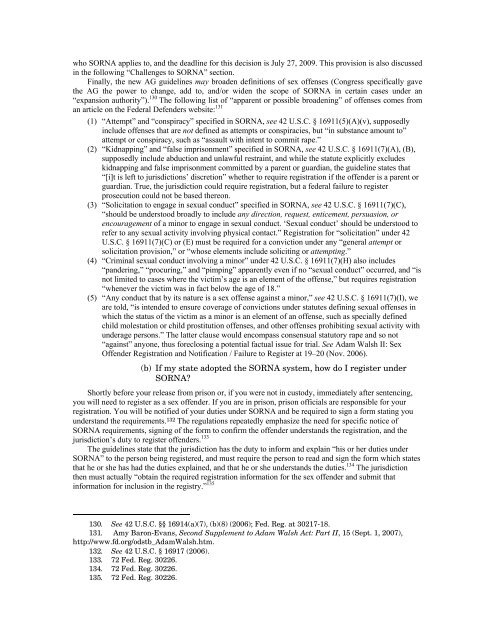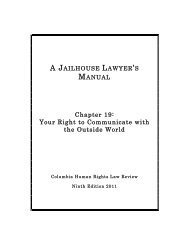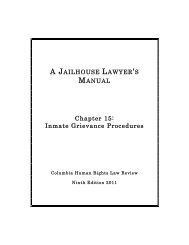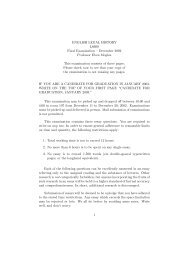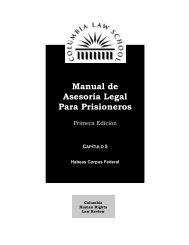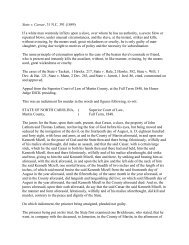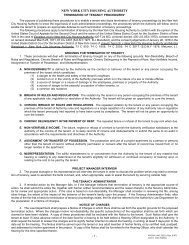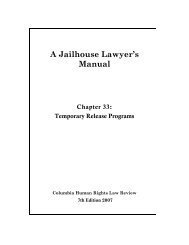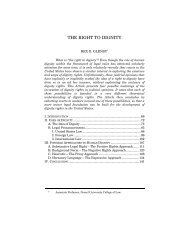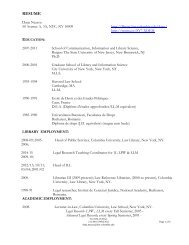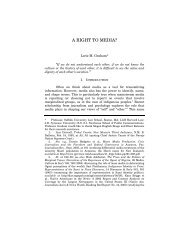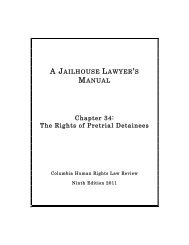Special considerations for sex offenders - Columbia Law School
Special considerations for sex offenders - Columbia Law School
Special considerations for sex offenders - Columbia Law School
You also want an ePaper? Increase the reach of your titles
YUMPU automatically turns print PDFs into web optimized ePapers that Google loves.
who SORNA applies to, and the deadline <strong>for</strong> this decision is July 27, 2009. This provision is also discussedin the following “Challenges to SORNA” section.Finally, the new AG guidelines may broaden definitions of <strong>sex</strong> offenses (Congress specifically gavethe AG the power to change, add to, and/or widen the scope of SORNA in certain cases under an“expansion authority”). 130 The following list of “apparent or possible broadening” of offenses comes froman article on the Federal Defenders website: 131(1) “Attempt” and “conspiracy” specified in SORNA, see 42 U.S.C. § 16911(5)(A)(v), supposedlyinclude offenses that are not defined as attempts or conspiracies, but “in substance amount to”attempt or conspiracy, such as “assault with intent to commit rape.”(2) “Kidnapping” and “false imprisonment” specified in SORNA, see 42 U.S.C. § 16911(7)(A), (B),supposedly include abduction and unlawful restraint, and while the statute explicitly excludeskidnapping and false imprisonment committed by a parent or guardian, the guideline states that“[i]t is left to jurisdictions’ discretion” whether to require registration if the offender is a parent orguardian. True, the jurisdiction could require registration, but a federal failure to registerprosecution could not be based thereon.(3) “Solicitation to engage in <strong>sex</strong>ual conduct” specified in SORNA, see 42 U.S.C. § 16911(7)(C),“should be understood broadly to include any direction, request, enticement, persuasion, orencouragement of a minor to engage in <strong>sex</strong>ual conduct. ‘Sexual conduct’ should be understood torefer to any <strong>sex</strong>ual activity involving physical contact.” Registration <strong>for</strong> “solicitation” under 42U.S.C. § 16911(7)(C) or (E) must be required <strong>for</strong> a conviction under any “general attempt orsolicitation provision,” or “whose elements include soliciting or attempting.”(4) “Criminal <strong>sex</strong>ual conduct involving a minor” under 42 U.S.C. § 16911(7)(H) also includes“pandering,” “procuring,” and “pimping” apparently even if no “<strong>sex</strong>ual conduct” occurred, and “isnot limited to cases where the victim’s age is an element of the offense,” but requires registration“whenever the victim was in fact below the age of 18.”(5) “Any conduct that by its nature is a <strong>sex</strong> offense against a minor,” see 42 U.S.C. § 16911(7)(I), weare told, “is intended to ensure coverage of convictions under statutes defining <strong>sex</strong>ual offenses inwhich the status of the victim as a minor is an element of an offense, such as specially definedchild molestation or child prostitution offenses, and other offenses prohibiting <strong>sex</strong>ual activity withunderage persons.” The latter clause would encompass consensual statutory rape and so not“against” anyone, thus <strong>for</strong>eclosing a potential factual issue <strong>for</strong> trial. See Adam Walsh II: SexOffender Registration and Notification / Failure to Register at 19–20 (Nov. 2006).(b) If my state adopted the SORNA system, how do I register underSORNA?Shortly be<strong>for</strong>e your release from prison or, if you were not in custody, immediately after sentencing,you will need to register as a <strong>sex</strong> offender. If you are in prison, prison officials are responsible <strong>for</strong> yourregistration. You will be notified of your duties under SORNA and be required to sign a <strong>for</strong>m stating youunderstand the requirements. 132 The regulations repeatedly emphasize the need <strong>for</strong> specific notice ofSORNA requirements, signing of the <strong>for</strong>m to confirm the offender understands the registration, and thejurisdiction’s duty to register <strong>offenders</strong>. 133The guidelines state that the jurisdiction has the duty to in<strong>for</strong>m and explain “his or her duties underSORNA” to the person being registered, and must require the person to read and sign the <strong>for</strong>m which statesthat he or she has had the duties explained, and that he or she understands the duties. 134 The jurisdictionthen must actually “obtain the required registration in<strong>for</strong>mation <strong>for</strong> the <strong>sex</strong> offender and submit thatin<strong>for</strong>mation <strong>for</strong> inclusion in the registry.” 135130. See 42 U.S.C. §§ 16914(a)(7), (b)(8) (2006); Fed. Reg. at 30217-18.131. Amy Baron-Evans, Second Supplement to Adam Walsh Act: Part II, 15 (Sept. 1, 2007),http://www.fd.org/odstb_AdamWalsh.htm.132. See 42 U.S.C. § 16917 (2006).133. 72 Fed. Reg. 30226.134. 72 Fed. Reg. 30226.135. 72 Fed. Reg. 30226.


